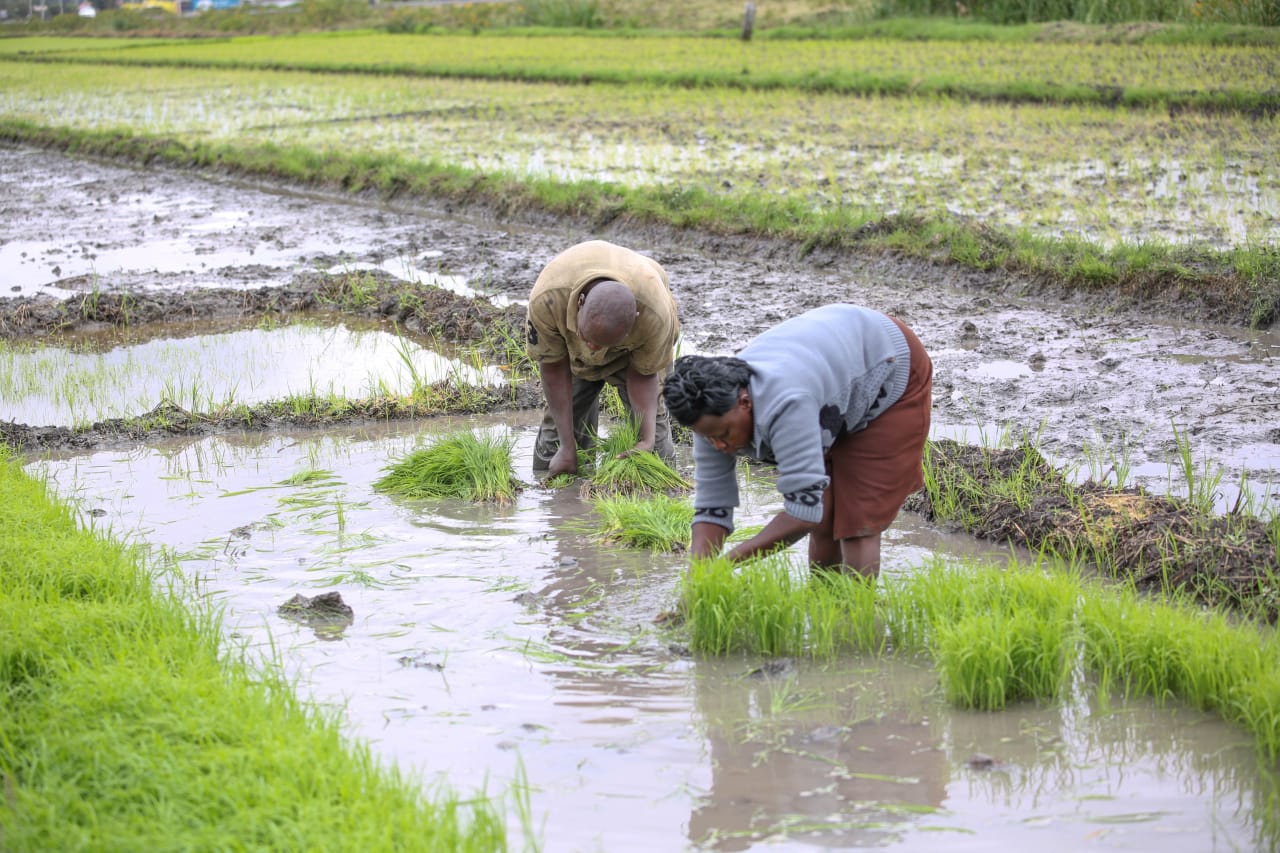
 Rice farmers in the Mwea Irrigation Scheme, Kirinyaga
Rice farmers in the Mwea Irrigation Scheme, KirinyagaThe High Court in Kerugoya has allowed the government to partially implement a gazette notice on the importation of duty-free rice.
The notice published on July 28 by Agriculture Cabinet Secretary Mutahi Kagwe allowed the importation of 500,000
metric tonnes of duty-free grade one milled white rice on or before December 31
this year.
This elicited sharp reactions from local leaders and rice
farmers, who complained that they were yet to clear their stocks and
that their stores were packed to the brim.
They said duty-free imports disadvantaged them and made it
difficult to sell their produce, despite the Mwea Irrigation Scheme being
the main producer of rice in the country.
The farmers then filed a case in court led by the Farmers
Party seeking orders stopping the implementation of the gazette
notice until their rice stocks were cleared.
On August 11, Justice Edward Muriithi granted the farmers
conservatory orders halting the implementation but partially lifted the orders
on Tuesday to allow importation of the duty free rice.
The judge said the solution to the issues
raised by the farmers and the government required a two-fold approach, including
the containment of a drop in farm price by phased importation of the deficit, and
encouragement of local production by the assured mop-up of farmers’ stock.
“What’s required is a scheme that not more than is necessary
to meet the deficit is imported while keeping the prices of the product stable,”
he said.
The judge took note of farmers’ optimism for a good harvest this year but also took care not to cause a food shortage crisis based on the
data presented by the government.
The court, however, cut the importation window from six months
to three and set a cap at 250,000 tonnes, with the importation
allowed only until October 31.
The orders, the court said, are subject to continuous
monitoring to establish the deficits in view of the paddy rice harvested from
the farms and the mop-up of similar stocks in farmers’ stores, and the need to
meet any shortages by further duty free imports.
“The respondents will be required to file an affidavit and
compliance report with the court on the expiry of the import window on October
31, 2025 for further directions as necessary,” the court ordered.
The government had defended its decision, saying its
objective was to attain food and nutrition security, explaining that Kenyan
farmers only produce 20 per cent of the national demand for rice and that the gap is filled by imports.
The respondents, who included the National Treasury, Ministry
of Agriculture and Livestock Development, Agriculture and Food Authority,
the Commissioner for Customs and Border Control, the Attorney General and Kenya
National Trading Corporation, said failure to fill the deficit would result in
rice shortages and sharp increase in prices.
The Commissioner for Customs and Border Control said the
local production of 264,000 tonnes of rice had already been exhausted
against a demand of 1.3 million tonnes.
The respondents were instructed to file in court reports
indicating the progress of the mop-up exercise and accurate information on the
local production of rice and the resultant deficit by November 11 this year, when
the case will be mentioned.
Mwea Rice Growers Society had in
May year lamented that it had 5,000 tonnes of rice in its stores
following the state’s decision to import another batch of 500,000 metric tonnes
in May last year that flooded the market, dampening their sales.
Chairperson Muriuki Ndege told journalists that
continuous duty-free imports discouraged farmers who toil in their farms for
months only to end up waiting for their returns for prolonged periods.
His sentiments were echoed by Governor Anne
Waiguru, who insisted that cheaper imports made it
impossible for local farmers to sell their produce.
"We have seven stores and only one is not
stocked. We have a stock worth over Sh500 million that we don't know what to do
with,” she said.
INSTANT ANALYSIS
The court cut the importation window from six months to
three and set a cap at 250,000 tonnes, with the importation
allowed only until October 31.
The gazette notice published on July 28 this year by Agriculture Cabinet Secretary Mutahi Kagwe allowed the importation of 500,000 tonnes of duty-free grade one milled white rice on or before December 31
this year.
The farmers then filed a case in court led by the Farmers Party seeking orders stopping the implementation of the gazette notice until their rice stocks were cleared.
















